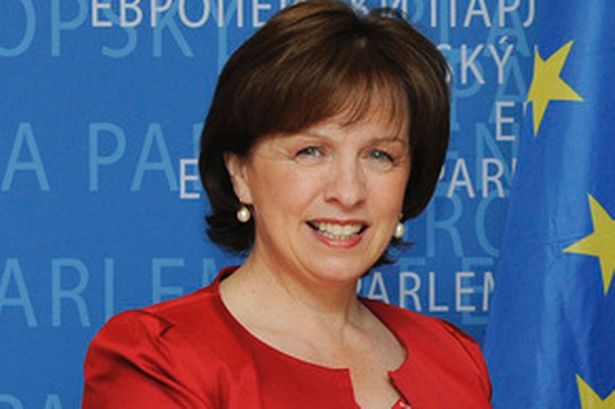Dodds Tells Farmers Research and Innovation Is Key to Growth
MEP Diane Dodds has insisted continued investment in research and innovation was key to realising the full potential of the Northern Ireland agriculture industry.
Speaking at the opening meeting of the Mid Tyrone UFU Group winter programme she said maintaining local centres of excellence including the AFBI laboratory at Omagh was key to growing and developing the industry.
DARD, like all other government departments, is coming under increasing pressure to make savings and cutbacks are inevitable. Mrs Dodds insisted reducing research and innovation was not an option at a time when there was a particular focus on growing the industry and the NI economy.
Speaking to the Ulster Herald after Tuesday evening’s meeting, she said, “I don’t have any information specific to the Omagh lab but in general an industry that doesn’t invest in research and innovation is an industry that isn’t going to grow and develop.
“We need the research and innovation to help us and farmers to become more competitive and therefore to have better prices, better utilisation
of land and stock and everything else.
“Research and innovation is absolutely key to the growth of agriculture. AFBI has some of the best research facilities. We absolutely must retain research and innovation, absolutely must retain the local centres of excellence and, more than anything else, translate that research from those
centres of excellence to on-farm, so that we can actually see greater growth and greater potential for businesses and therefore greater profitability.
“Every aspect of government has budgetary challenges and we really need to get the best value for the money. But key to growing agriculture,
key to and by extension growing the Northern Ireland economy, is research and innovation. It’s fundamental.”
With inevitable DARD cutbacks in the pipeline, the MEP said it was hugely important the lines of communications between the department and farmer remained unaffected.
“We need to preserve those front-line services to help farmers do the job that they need to do and comply with the regulations. I don’t know or have had no indication yet how the minister intends to deal with those budgetary pressures but she will have to. Key for us is the maintaining of front line services.”
DAIRY INDUSTRY CONCERNS
During her presentation Mrs Dodds spoke of the challenges facing all farming enterprises across the board although she expressed particular concern for the dairy industry in the immediate future.
With milk prices dropping and predicted to continue decreasing she said she would again be making the case for an increase in the EU intervention price which stands between 16 and 17p.
“I think the dairy industry in the long term has a very sound future. What I think we are currently experiencing is a period of volatility,“ she continued. What we need from the European Commission and we talk about the safety tools that they have and safety nets they have for the industry. We need to see them employ some of those fairly soon in order to catch the market before it falls so far that we allow some of our good
producers to fall through the net.
“Intervention prices are so low that we would be on our knees as an industry before we would hit it. We’d like to see those rise so that they would meet farmers at a level that is more realistic.
“Average cost of production is about 25p per litre. The intervention price is set so low it’s unrealistic. We would be at real crisis level if we reached that again.
“If there is a dip in the world commodity market the Northern Ireland dairy industry feels that sharper and sooner than many other parts of Europe. I see Poland making the case for a rise in intervention prices and also export refunds.
That’s a case I have been making for some time now in the European Parliament and this week I will be reinforcing the point if we have safety
tools we need to use them.”
Source: ulsterherald.com




